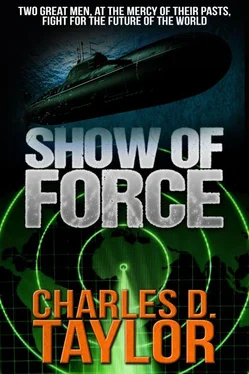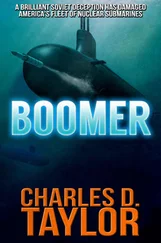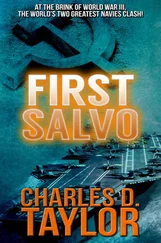"Did he say that?"
"No, sir. There was no need. Admiral Collier understands the situation."
"Did he say anything else?"
"Just that the ambassador would accompany him. They request the normal courtesies of a meeting. He asked you to name a time."
Gorenko smiled inwardly. There was no change in his facial expression before the younger man. "Thank you for coming to me. There is no message to return. I shall contact him when I am ready." He silently dismissed the other by turning his back and walking slowly to the window. The snow was starting again.
Gorenko had returned to Moscow before the end of the war. His first office wasn't far from the one he now occupied. After Stalingrad, he had gone back to sea and had been promoted to flotilla commander before they sent him to the staff position in the Kremlin.
He had been able to bring Alex with him. The boy's mother said anything was better than the hunger they faced in that May of 1945. The boy was then two years older than the first time they had met. He was taller at twelve but had probably not put on a pound since their first meeting.
It had been mid-January, and the icy winds sweeping down from the steppes brought unending misery to the hard-pressed peasants. Somehow Gorenko had survived the counteroffensive. Chuikov had attacked on each of the three fronts around the city and had surrounded Paulus. The Germans would not surrender, convinced that von Mannstein would come to their aid. They chose slow annihilation until Paulus could no longer accept the slaughter. When it became apparent that the worst was over, Gorenko had been released to the Navy. Medals were awarded to the leader of the sailor army and his men. There was even a celebration. Somehow the remnants of the 62nd Army had found the vodka, and they stole enough pigs from the peasants to honor the sailors in proper army style.
And then he had kept his promise to Georgi. Rather than go back toward the Black Sea with his men, he had first crossed the frozen Volga and gone east — to Leninsk. There were no trains. He had ridden partway with the army and then managed the rest of the way in the various wagons that carried what little the people still had.
Leninsk had been a poor town, but when he arrived it was a nothing town. The planes had bombed it often, for no reason he could ever determine. The major buildings were destroyed. The people lived in hovels thrown together from the remains of their homes. But he had found the Kupinsky family, still with half a house. It had suffered a near miss, and its survival justified some of the neighbors moving in with them. If it had been his home, he would have gone back to the front, he thought.
He had first seen the boy sitting on top of a dirty pile of snow. The child was dirtier than the snow and dressed in rags, but saw the military man coming and had stared at him. When the boy saw that the uniform was not quite the same as the regular infantry he had stood up, eyeing the stranger more closely. He watched the man come up directly in front of him and then saluted gravely in a little-boy manner. Gorenko returned the salute.
The child said nothing, and the man finally asked, "Could you tell me if this is the Kupinsky home?"
A shy nod was his only answer.
"Is your mother at home?" Another nod. "Are you young Alexander Kupinsky?"
The boy nodded and smiled. "Yes." He saluted the man again. "Do you know my father?"
This time it was Gorenko who nodded without speaking.
After staring at the officer before him for just a second, tears began to form at the corners of the boy's eyes. "He's dead, isn't he? I don't have a father any more, do I?"
The passing seconds seemed like hours as he looked down at the child. "I will be your father now," he had said firmly, his eyes reflecting the man who had saved his life in the streets in Stalingrad.
He had taken the boy's bony hand in his own and led him into the house. He gave the woman money for herself and the child, and had sent more whenever he could during the war. Once in 1944, he was able to visit, when the trains were running again. And the following year, when the war ended, she had let him take the boy back to the capital city with him. There was nothing she could offer the child in Leninsk, and she could barely sustain herself. She asked only that Alex be sent home to visit each summer if the commander had the money to do so. Each summer, he did return to his native town to see his mother, and each time he brought money from the man, who was now an admiral.
Alex became a member of Gorenko's family in those early years in Moscow. He was treated as a son, just as he had been told on that wintry day in 1943, and loved as one also, for there were no other children. He was allowed to enter one of the Nakhimov schools because of Gorenko, even though he was older than the others. When he was seventeen, he was entered in the Frunze Higher Naval School. He would not be an infantryman dike his father.
Gorenko remembered the vacations the boy had, when he returned to his adopted family full of new ideas from the school. It was not an easy life, but few Russian young men his age had any idea what it meant to be easy. The two talked late into the nights of the navy and what young Alex would do when he was graduated. Many of the discussions were serious, about Russian history, and strategy, and the great military thinkers such as von Clauswitz and Mahan. Alex was not just smart. He had a brilliant, challenging mind, and the Admiral treasured these evenings.
Alex wanted to learn at any time of day or night. He forgot nothing. History was one of his favorite topics, and he sensed the struggles of the Russian people more from Gorenko than from the books. He learned of the many nations that had invaded their homeland at one time or another, and how they were always defeated by the stolid army and the Russian winters. When their armies were desperate and there was no food and they had only the clothes on their backs, then the winds blew from the north and the snow came. And the Russians had time to recoup and fight again.
Now, in the twentieth century, Gorenko taught his son how Russia would expand. No longer would they be invaded from every direction. They would expand their sphere and become a major force in the world. They would not join other countries, but they would have other nations turning to them. Always, a prime factor in this dream was Gorenko's desire to change his Navy from a homeland defense force to a blue-water fleet, commanding the oceans of the world.
He taught Alex the lessons of war. The first thing he would accomplish was, the building of a submarine force. It was necessary if you were to protect your own supplies and deny them to your enemy. First you had to defend yourself, then you could take the offense. The undersea fleet would be followed by a surface force second to none. He remembered explaining to Alex that more than 20 million Russians had died during this last war, more than any other country, and never again would it happen if they could command the seas. Alex learned about seapower at the feet of the man who understood the American, Mahan. Each time they talked, Alex was reminded that the country that controls the oceans of the world controls the countries of the world. The necessity for intellect in the military was constantly driven home to Alex, now a young man, as he graduated from Frunze. As much as Gorenko hated the Germans, he told many stories of the General Staff methods that the Russians now emulated. It was always a good lesson to see how a small state like Germany could invade a large one like Russia. Only the best and the brightest reached the top, and that's where Alex would go.
In the mid-fifties, Gorenko became Commander in Chief of the Soviet Navy. Alexander Kupinsky had by that time exhibited his abilities both in the naval schools and on board ships. He was chosen for submarine training. He joined the fleet that his stepfather had created in less than ten years. Submarine command was Alex's dream, and Gorenko was sometimes hurt that he could not express to his comrades the pride he felt in the young man. Alex would have to make it on his own, without help from the Admiral.
Читать дальше












